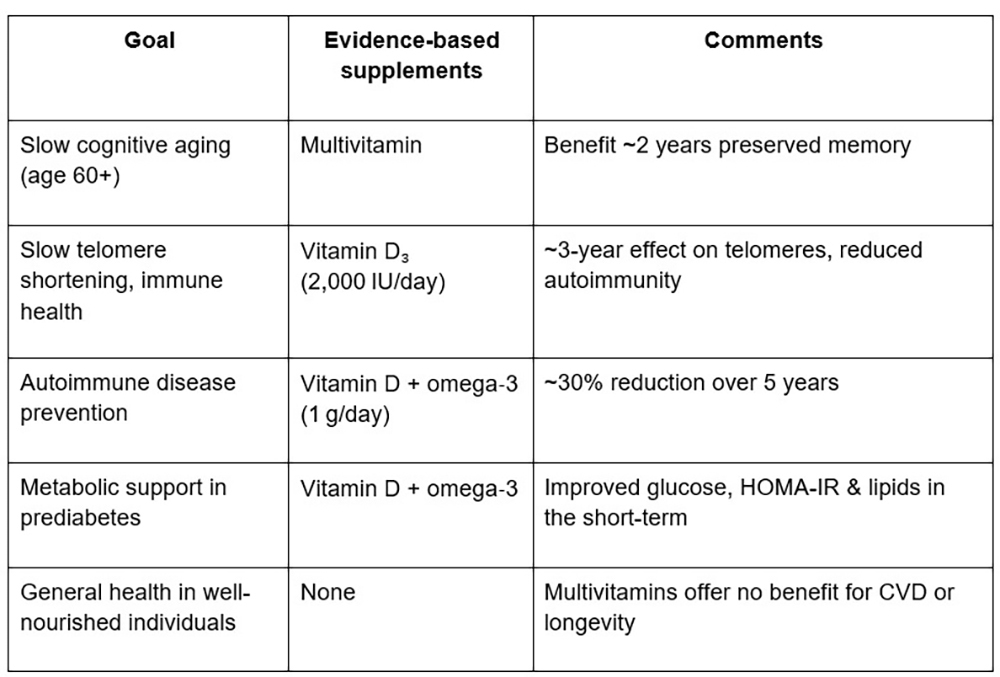Despite their widespread use, daily multivitamins offer limited benefit for most healthy adults and may even be unnecessary spending. This paradox arises because while these supplements are marketed as health insurance, scientific trials show minimal impact on longevity or chronic disease. However, a few targeted supplements like vitamin D, omega‑3s, and iron/B vitamins do offer proven benefits when used judiciously. Drawing on recent large randomized controlled trials especially the landmark VITAL and COSMOS studies,this article explains which supplements work, who might benefit, and how to make smarter decisions.
The Multivitamin myth
Why multivitamins are so popular
From high street pharmacies to online ads, multivitamins promise wide-ranging health support. People often see them as an insurance policy for dietary gaps but the science says otherwise.
What the largest and most rigorous trials show
A meta‑analysis of over 5,000 older adults found a modest but statistically significant slowing of cognitive decline about two years of preserved memory—with daily multivitamin use in people aged 60+ (the COSMOS trials). However, extensive cohort and clinical data show no benefit in reducing cancer, cardiovascular disease, or overall mortality in generally healthy adults.
The wasted cost
For most adults with a balanced diet, excess vitamins are excreted (water-soluble) or accumulate (fat-soluble), leading in some cases to risk yet conferring no measurable health advantage.
What actually works: evidence-based supplements
Rather than blanket multivitamin use, focusing on evidence-supported nutrients can save money and improve outcomes.
Vitamin D₃ (2,000 IU/day)
Cellular ageing & telomere length: a sub-study of the VITAL trial involving ~1,000 participants over 4 years found that 2,000 IU daily significantly slowed telomere shortening equivalent to nearly three extra years of biological age preservation compared to placebo.
Autoimmune disease reduction: over 5+ years in ~25,000 older adults, vitamin D supplementation reduced the incidence of confirmed autoimmune disease by approximately 22%, and when combined with omega‑3, reductions reached ~30%.
Cardiovascular & cancer prevention: the broader VITAL trial did not show significant reduction in CVD or cancer from D₃ or omega‑3 supplementation alone, though inflammation markers and immune endpoints improved.
Marine omega‑3 fatty acids (EPA + DHA, ~1 g/day)
Limited benefits on mortality but potential on aging: omega‑3s haven’t reliably reduced CVD or mortality in major meta‑analyses, and high doses (>1 g/day) may slightly increase the risk of atrial fibrillation in some groups.
However, a recent Swiss trial (~800 seniors) showed that daily 1 g omega‑3 supplementation slowed epigenetic aging (via DNA methylation markers), especially when combined with vitamin D and exercise, equating to ~3–4 months of slower biological aging.
Synergy with vitamin D on autoimmunity: when used alongside D₃, omega‑3s contributed to a ~30% reduction in autoimmune diseases—even though alone the effect was smaller (~15%).
Effects on metabolic health: in women with pre-diabetes and vitamin D deficiency, co-supplementation of D₃ and omega‑3 improved fasting glucose, insulin resistance (HOMA-IR), and triglycerides over short-term follow-ups.
Multivitamins (Targeted to older adults or deficient populations)
Cognitive benefits in older adults: the COSMOS cognitive data (573 in-person and 5,000+ meta-analyzed participants aged 60+) showed slower global cognitive decline and memory loss by about two years in those taking a daily multivitamin versus placebo—even after adjusting for diet quality, sex, age, and ethnicity.
But limited beyond cognition: for chronic disease prevention such as cancer, heart disease, and mortality—multivitamins continue to show negligible effects in people without nutrient deficiencies.
Iron, B‑vitamins, creatine (in specific contexts)
Iron and B‑Vitamins: when lab-confirmed deficiencies exist such as low ferritin (iron) or vitamin B₁₂/folate supplementation can alleviate anemia and fatigue. However, in people with normal levels, supplementation shows no benefit and may cause harm in megadoses.
Creatine: well‑studied for improving muscle strength, cognitive performance, and bone health particularly in older populations or those engaged in resistance training.
The research quality and bias problem
Transparency issues: many supplement trials suffer from publication bias with up to 50% non-publication rates in EU studies, and industry-funded RCTs more likely to report positive outcomes.
Methodological constraints: studies may use low doses, short durations, small samples, or surrogate markers limiting generalizability. For example, inflammation markers in VITAL did not drop at one year but later did, suggesting effects emerge over time.
How to make smarter supplement choices
Step 1: assess your personal status
Blood testing: check vitamin D (25(OH)D), ferritin (iron), and B₁₂ and folate.
Risk groups: older adults, people with darker skin or limited sun exposure, vegetarians/vegans, and pregnant women may need targeted supplementation.
Step 2: prioritize evidence-based supplementation
Vitamin D₃: consider 2,000 IU/day if deficient, especially for bone health, immunity, slowing biological aging, and reducing autoimmune risks.
Omega‑3 (EPA/DHA ~1 g/day): may modestly support healthy aging and autoimmune disease prevention best when combined with D₃ or diet rich in oily fish; watch for dose-related arrhythmia risk in specific groups.
Multivitamins (older adults only): can slow cognitive decline among adults aged 60+ about two years of preserved memory with long-term use (~3 years) (Harvard Health).
Iron & B‑vitamins: effective when lab-confirmed deficiency is present avoid blind supplementation unless indicated.
Creatine: beneficial for muscle and cognitive support, especially when paired with resistance exercise in aging individuals.
Step 3: avoid broad-spectrum multivitamins if nutrient status is adequate
Research indicates no health benefit in high-quality, disease prevention, or longevity from general-use multivitamins in well-nourished adults.
Step 4: choose quality and dosage wisely
Opt for supplements with USP/NSF third‑party testing. Never exceed upper safety limits (D₃ >4,000 IU/day may cause hypercalcemia). Avoid megadoses of fat-soluble vitamins and minerals like vitamin A, E, beta-carotene, or iron in the absence of deficiency.
Step 5: complement with lifestyle
A nutrient-rich whole-food diet offers fiber, phytonutrients, and micronutrients more effectively than pills alone. Regular physical activity enhances nutrient absorption, muscle health, and cognitive resilience.
Case scenarios: applying the evidence
Case A: healthy 35-year-old with a balanced diet. Recommendation: no routine multivitamin. Focus on whole foods. Only supplement if lab tests reveal deficiencies (e.g., vitamin D, iron).
Case B: 65-year-old non-smoker concerned about memory. Recommendation: a daily multivitamin may offer modest cognitive benefit. Assess vitamin D status; supplement accordingly. Consider omega‑3 supplementation and regular exercise.
Case C: Woman age 60 with vitamin D deficiency and autoimmune family history. Recommendation: vitamin D₃ at 2,000 IU/day is likely beneficial for reducing autoimmune risk and slowing telomere shortening. Add omega‑3 for potential synergy and lifestyle support.
Case D: young adult vegetarian with low B₁₂ and borderline iron. Recommendation: Supplement B₁₂ and possibly iron under medical supervision to restore normal levels. No need for a multivitamin.
Why the supplement industry persists
Aggressive marketing encourages the belief that supplements are necessary “insurance.” Fear of nutrient deficiency drives widespread use even among low‑risk groups. Regulations are weaker than pharmaceuticals; companies may exaggerate claims or understate risks.
Summary table
FAQs (SEO-Friendly Section)
Q: Do multivitamins improve lifespan or prevent disease?
A: No solid evidence supports benefits for cancer, heart disease, or mortality in generally healthy adults.
Q: Who should take a multivitamin?
A: Primarily older adults with risk of poor diet or mild nutritional deficiency especially if cognitive decline is a concern.
Q: Is vitamin D supplementation beneficial?
A: Yes, particularly for those with a deficiency. In clinical trials, 2,000 IU/day slowed telomere shortening and reduced autoimmune disease.
Q: Are omega‑3 supplements worth it?
A: They show promise for healthy aging and immune support—especially in combination with vitamin D and exercise, but high doses may increase atrial fibrillation risk.
Q: Should I take iron or B vitamins without testing?
A: No, only supplement when a deficiency is confirmed via blood tests to avoid harm from oversupplementation.
Conclusion
The supplement paradox lies in the mismatch between popular belief and clinical reality. Millions are spent on multivitamins expecting disease prevention, yet most of these products offer little to no benefit except in specific cases, such as older adults using multivitamins for cognitive preservation or individuals with specific deficiencies.
Better strategies involve personalized supplementation backed by lab testing focusing on vitamin D, omega‑3s, iron/B‑vitamins, and creatine when indicated, combined with a wholesome diet and active lifestyle.
Ultimately, smart supplementation, not blanket pill‑popping, is what returns genuine health value and avoids wasted expense.
References
Effects of Vitamin D3 and Marine Omega-3 fatty acids supplementation on Biomarkers of Systemic Inflammation: 4-Year Findings from the vital randomized trial.
Vitamin D and marine omega-3 fatty acid supplementation and incident autoimmune disease: VITAL randomized controlled trial, Reddit.
An omega-3 dose a day could slow ageing process, ‘healthspan’ trial finds, Guardian.
This underrated vitamin could help slow biological aging, new study suggests.
Third major study finds evidence that daily multivitamin supplements improve memory and slow cognitive aging in older adults.
Is your daily multivitamin as effective as you think?
Omega-3 fatty acid. Wikipedia.
The effect of omega-3 and vitamin D co-supplementation on glycemic control and lipid profiles in reproductive-aged women with pre-diabetes and hypovitaminosis D: a randomized controlled trial
Multivitamin. Wikipedia.
















